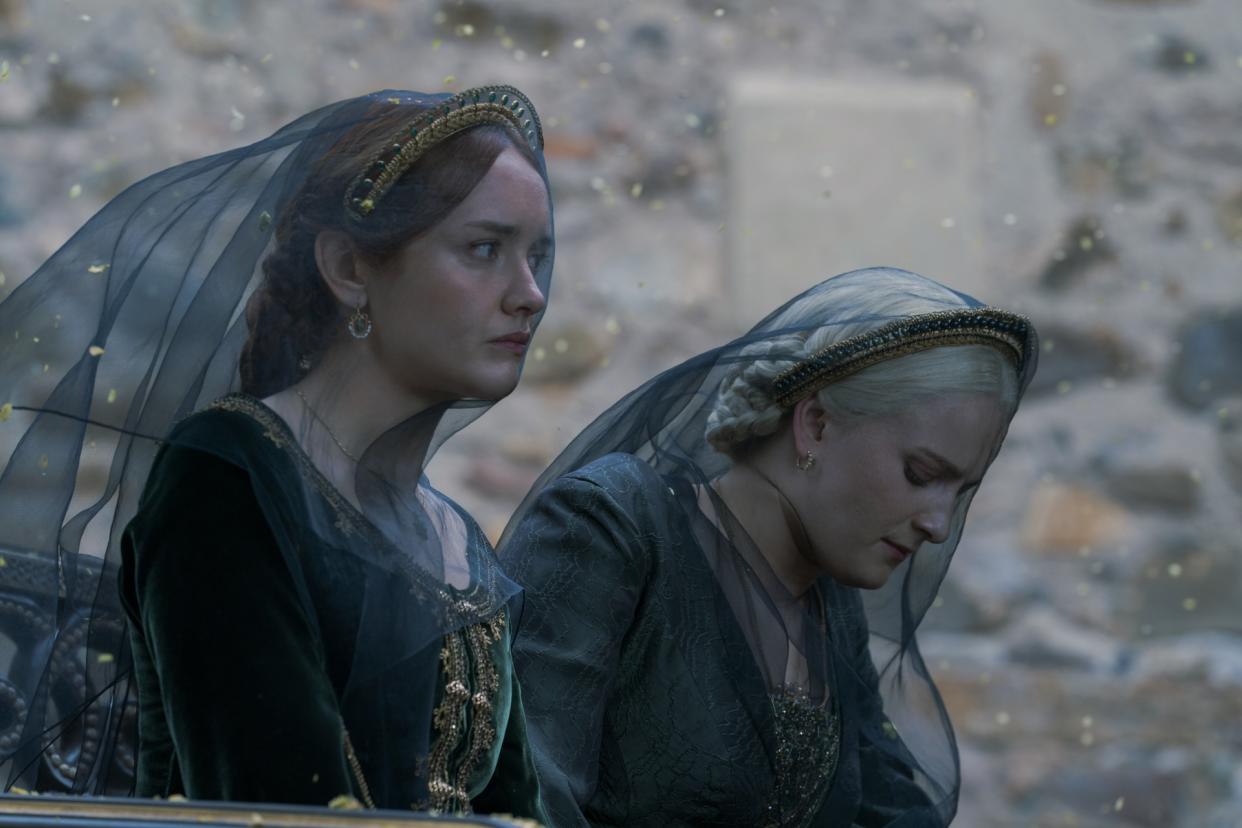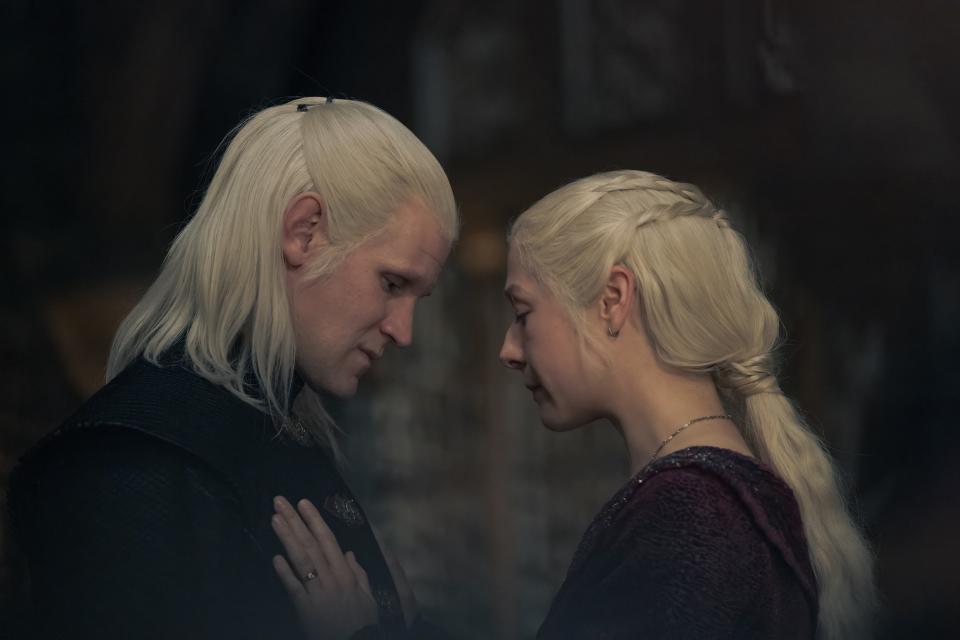‘House of the Dragon’ Season 2, Episode 2 Review: The Cost of War

Time doesn’t skip anymore on “House of the Dragon.”
Just as Season 2, Episode 1 picked up not more than a day or two after Season 1’s conclusion, mere hours pass between Episodes 201 and 202. The 72-minute episode written by Ryan Condal and directed by Claire Kilner is the series’ longest to date, demonstrating the cost of the Targaryen civil war in the aftermath of young Jaehaerys’ death, but also in how it impacts those not of royal blood.
More from IndieWire
The quiet, panicked opening sequence depicts servants and small folk fleeing and frenzied, the way civilians might evacuate an unsafe public space even in our world; something bad has happened, something we must get away from — the camerawork and an erratic but fitting score from Ramin Djawadi convey how the very environment shifts when tragedies like this occur. Djawadi’s most celebrated work tends to be melodically memorable, easy to hum (like the show’s theme), but here he shows off his range with an uncanny solo violin and tune that couldn’t be harder to replicate.
In IndieWire’s review of Season 2 (at least, of the four episodes critics screened before release), Ben Travers pointed out that “Alicent (Olivia Cooke) is left with the ‘what hath I wrought’ arc,” which continues here from Episode 1. Even though this child murder isn’t indirectly her fault or caused by her children, she and the rest of the Greens are quick to recognize the act of revenge set in motion with “A Son for a Son,” the dominos knocked over by Aemond (Ewan Mitchell) that escalated this war into a whole new echelon (all she wanted was Luke’s eye). The “what hath I wrought” arc isn’t stale as of Episode 2, and Cooke is excellent, especially in her first scene where shock and grief intertwine. Every gasp, choke, and sob elevates the dialogue and emotion at the right moments; the fear imbued in “the gods punish us. They punish me,” and the way she breaks down at the mere thought of daughter Helaena (Phia Saban) experiencing the loss of a child.
For whatever team characters or viewers may align with, this episode and the story at large don’t work if you can’t feel for Helaena and Aegon (Tom Glynn-Carney). Saban and Glynn-Carney deliver two outstanding performances, each with a unique and disparate approach to their character’s anguish and and how to even begin moving forward. Where Aegon howls with rage, hurls furniture, and accuses his council of negligence (not to mention the execution of every ratcatcher in the Red Keep, congratulations to the rats), Helaena is weeping, silent, secluded. Her distress at the funeral tracks with all of Saban’s choices so far, that a woman who prefers privacy and seclusion would balk at the opposite — especially while sitting in a carriage behind her son’s decapitated body.
Both the small council and procession scenes underscore the weirdness of war, in that blame for Jaehaerys’ death falls on Rhaenyra (Emma D’Arcy). It doesn’t matter that “the boy” (as he is strategically referred to when people ostensibly can’t bear to utter his name) was killed by a gold cloak, a hired gun; nor does it matter that Daemon (Matt Smith) solicited this crime in the first place or that Mysaria (Sonoya Mizuno) pointed him in the right direction. What matters is whose banners any of these people would fly and which ruler they support on the throne: Rhaenyra. By contrast, the blame for Lucerys’ death ends up largely with Aemond or his dragon Vhagar instead of Aegon — perhaps another way in which Westerosi patriarchy isn’t so dissimilar to our own.

But no matter how much hatred and name calling they send her way from King’s Landing, Rhaenyra knows the truth, and her doubts about Daemon lead to an electric scene between D’Arcy and Smith (if you slow it down and watch it backward you’ll hear “WHERE ARE MY EMMYS” on a loop). It helps that the show’s de facto leads are two of the finest actors in a massively skilled company, but this is one of those scenes that sets “House of the Dragon” apart from “Game of Thrones” on writing alone. The conversation flows naturally, the language fits the show’s universe, and the actual content of what they’re saying is deeply compelling and propels the show’s narrative. Daemon’s dialogue and body language acutely capture any person too obstinate to admit their true feelings or that they were wrong about something. Kilner keeps the actors and camera moving organically, tracking how the relationship itself shifts within just a few minutes. Up until now, at least throughout their marriage, Rhaenyra and Daemon have been a united front, no matter what other people may say about either or both of them behind their backs. Here, those cracks burst open, fracturing an already divided house.
The quick brothel scene with Aemond has two critical moments; first, his admission of guilt about “that business with Luke,” which is just about the least enthusiastic declaration of regret possible (also not an apology), and doesn’t carry much weight uttered behind closed doors to a stranger. It’s for the audience, and part of the show’s ongoing campaign of humanizing occasionally monstrous individuals (Aegon, Daemon), but such is the game with the thrones and all.
The second key takeaway is what his companion says, though Aemond himself may not be receptive to it: “When princes lose their temper, it is often others who suffer — small folk like myself,” she says. Daemon lost his temper and executed a half-baked revenge plan that killed a child; Aegon lost his temper and ordered the deaths of men he employed, men with wives and children who then felt Aegon’s own pain.
And then there are the soldiers, the ones who lose the most even if it’s what they pledged. Episode 202’s climax is the reunion, battle, and demise of knights Arryk (Luke Tittensor) and Erryk (Elliot Tittensor) Cargyll. On the bombastic orders of Ser Sore Loser Criston Cole, Arryk is sent to Dragonstone with orders to kill Rhaenyra while pretending to be his brother. On the surface, this plan is outright goofy — Otto (Rhys Ifans) even refers to it as a “prank” — but couldn’t be more dangerous for Arryk, surrounded by enemies. It’s left unsaid, but this is not a mission from which he likely would have returned, even if he did succeed.
It’s a brutal fight, directed with the same dynamism as Rhaenyra and Daemon’s earlier argument. Punching, kicking, and other hand-to-hand combat intercut the swordplay, with D’Arcy caught in the middle (rendered a little useless, even if they continue to act with full gusto). The twins’ shouts of agony are as much physical pain as emotional turmoil because they know before everyone else present that this is certainly the end. It’s a magnificent farewell for the Tittensor brothers, a final scene as memorable and impactful as any lead character could ever hope for and once again illustrating the very human lives being lost in a dance of dragons.
The weakest part of the episode — and the only time I really felt its runtime — is that final scene with Alicent and Cole. Their pairing isn’t in “Fire & Blood,” and it’s somewhat repugnant, even if that’s by design. It’s a bit shallow, as added backstory goes, for Alicent to have an affair with Rhaenyra’s old lover, but it’s also not intended to engender empathy or compassion in viewers. There is no absolution for either of these people, as Cole himself says in Episode 2 — but to that end there’s also no added value to watching them make the same bad decisions over and over, least of all if it’s just for the sake of keeping sex in the show when it’s transfixing enough otherwise. I (and the gods) will reserve judgment for now and monitor the relationship’s trajectory. But please, lock the door this time.
Grade: B
Best of IndieWire
Sign up for Indiewire's Newsletter. For the latest news, follow us on Facebook, Twitter, and Instagram.


